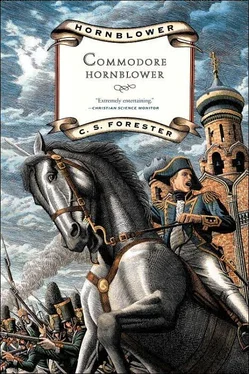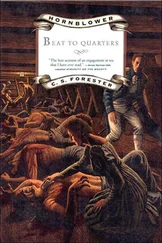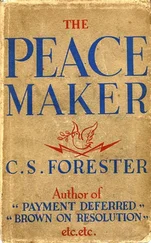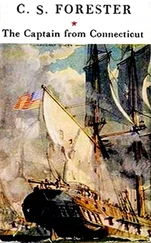“Come along,” said Hornblower.
In the gallery under the dome they could look down upon the siege. The zigzag approach trench was almost half-way towards the defences, the head of it almost obscured by flying earth as the Russians fired furiously upon it. But the central redoubt which covered the entrance to the village was in bad shape, its parapets battered into nothing more than mounds, a gun lying half buried beside its shattered carriage, although the other one was still being worked by a devoted little group. The whole of the French works were obscured by the thin pall of smoke which spread from the breaching battery, but the smoke was not so thick as to hide a column of infantry marching down towards the first parallel from the rear.
“They relieve the guard of the trenches at noon,” explained Clausewitz. “Where are these boats of yours, sir?”
“Here they come,” said Hornblower.
They were creeping over the silvery water, fantastic in appearance, the ketches with their sails furled and the ugly bulks of the lighters beside them. The long clumsy sweeps, a dozen on each side, looked like the legs of a water-boatman on a pond, but far slower in movement as the toiling seamen who manned them tugged them through each successive endless stroke.
“Somers! Gerard!” said Hornblower, sharply. “How are your signalling arrangements working out? Lash those blocks to the cornice up there. Come along, you haven’t all day to get ready in.”
The midshipmen and seamen addressed themselves to the business of making a signalling station up on the gallery. The blocks were lashed to the cornice and the halliards rove through them, the Russian staff watching the operation with interest. Meanwhile the bomb-ketches came crawling up the bay, painfully slowly under their sweeps, heading crabwise on account of the gentle breeze on their bow, before which they sagged away to leeward quite perceptibly to Hornblower’s eye above them. No one among the enemy seemed to be paying them the least attention; Bonaparte’s armies, lords of Europe from Madrid to Smolensk, had had few opportunities of becoming acquainted with bomb-ketches. The firing from the big battery went on steadily, pounding at the crumbling Russian earthworks below, with the Russians returning the fire with desperate energy.
The Harvey and the Moth came creeping in until they were quite close to shore; Hornblower through his glass could see minute figures moving in their bows, and knew they were dropping their anchors. The sweeps worked spasmodically, first on one side and then on the other—Hornblower up in the gallery, his heart beating fast, could well picture Mound and Duncan on their quarter-decks shouting their orders to the rowers as they manoeuvred themselves about like beetles pinned to a card. They were placing themselves in position to drop other anchors at the stern, so that by veering and hauling in on their cables they could swing themselves so as to be able to point their mortars anywhere along a wide arc. Clausewitz and the staff looked on uncomprehending, having no notion of the meaning of these manoeuvres. Hornblower saw the stern anchors let go, and could see little groups of men bending to work at the capstans; the bomb-ketches turned almost imperceptibly first this way and then that as their captains trained them round by the aid of the leading marks on the shore.
“There’s the ‘ready’ flag going up in Harvey ,” said Hornblower, the glass at his eye.
The sheave in the block above his head shrilled noisily as the halliard ran over it, bearing the acknowledgement. A big puff of smoke suddenly spurted upwards from the Harvey ’s bows; Hornblower at that distance could see nothing of the shell in its flight, and he waited nervously, compelling himself to search the whole area round about the battery to make sure of seeing the burst. And he saw nothing, nothing at all. Reluctantly he ordered hoisted the black cone for ‘unobserved’ and Harvey fired again. This time he could see the burst, a little volcano of smoke and fragments just beyond the battery.
“That was over, sir,” said Somers.
“Yes. Make that to Harvey .”
Duncan had anchored Moth by now, and was flying the signal of readiness. Harvey ’s next shell fell square in the centre of the battery, and immediately afterwards Moth ’s first shell did the same. At once the two ketches began a systematic bombardment of the battery, dropping shells into it in constant succession, so that there was not a moment when a fountain of smoke and earth was not apparent within its earthworks. It was a plain rectangular structure, without traverses or internal subdivisions, and there was no shelter for the men within it now that their enemy had found means to circumvent their earthworks. They only maintained their fire for a few seconds, and then Hornblower could see them running from their guns; the interior of the battery looked like a disturbed ants’ nest. One of the big thirteen-inch shells landed full on the parapet, and the smoke clearing away revealed the breastwork blown flat, opening the interior of the battery to view from ground level in the village, and through the gap was visible the muzzle of a dismounted siege-gun, pointed skyward and helpless—a cheering sight for the defence. That was only the beginning. Gap after gap was blown in the earthworks; the whole interior was plastered with shells. At one moment there was a much bigger explosion than usual, and Hornblower guessed that an ‘expense magazine’—the small store of gunpowder kept in the battery and continually replenished from the rear—had blown up. Down below him the defence had taken new heart, and every gun along the menaced front had reopened fire; it was a shot from the village, apparently, which hit the muzzle of the dismounted gun and flung it back upon the ground.
“Signal ‘cease fire’,” said Hornblower.
Thirteen-inch shells were not munitions of war that could be readily obtained in the Baltic, and there was no purpose in wasting them upon a target which was silenced and at least made temporarily useless. And then came the countermove on the part of the attack, as he had expected. A battery of field artillery was coming over the distant slope, six guns, minute at that distance, jolting and swaying after their limbers. The country was still marshy, for the summer was not yet old enough to have dried up the fields, and the artillery, hock and axle-deep in the mire, made only slow progress.
’Signal for the target to change,’ ordered Hornblower.
There was no means of observing the fall of the shells on the new target, for the bomb-ketches were dropping them just over the high dyke. It was a matter of chance should they do any destruction, but Hornblower could guess that the park and depots of an army of sixty thousand men conducting a first-class siege were likely to be both extensive and crowded; a few shells dropped there might do good. The first field battery was approaching the water’s edge, the horses wheeling round to leave the guns pointing at the bomb-ketches at neat geometrical intervals.
“ Harvey signals she’s shifting target, sir,” reported Gerard.
“Very good.”
Harvey was firing at the field battery; it took her a little while to get the range, and field-guns, spaced far apart in a long thin line, were not a good target for mortars, even though the fall of the shells was now under direct observation. And a second battery was coming up on the flank of the first and—Hornblower’s telescope could easily make them out across the narrow extremity of the bay—there were more guns coming into action to put the bomb-vessels under a cross-fire. One of Harvey ’s shells burst close beside one of the guns, presumably killing every man serving it, but by chance leaving the gun itself still on its wheels. The other guns had opened fire, the smoke creeping lazily from their muzzles. Across the bay the other field batteries were coming into action, although at very long range for field artillery. There was no purpose in continuing to expose the bomb-ketches to the fire of the shore; Macdonald had two hundred field-guns, and there were only two bomb-ketches.
Читать дальше












